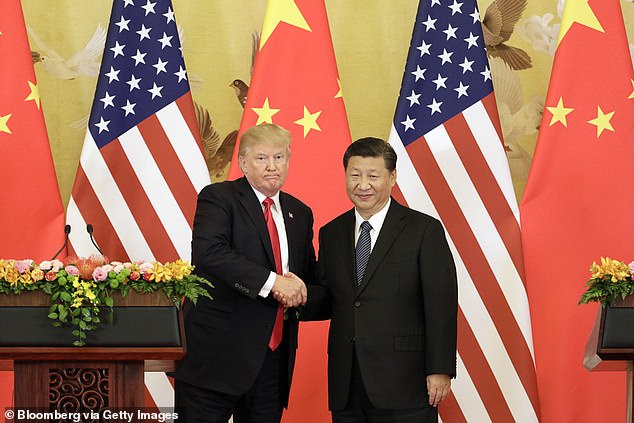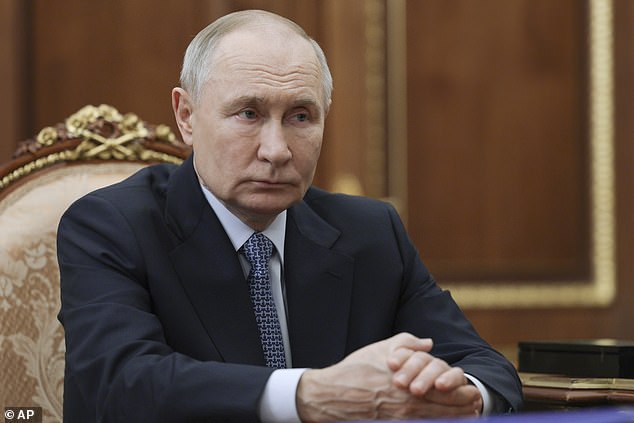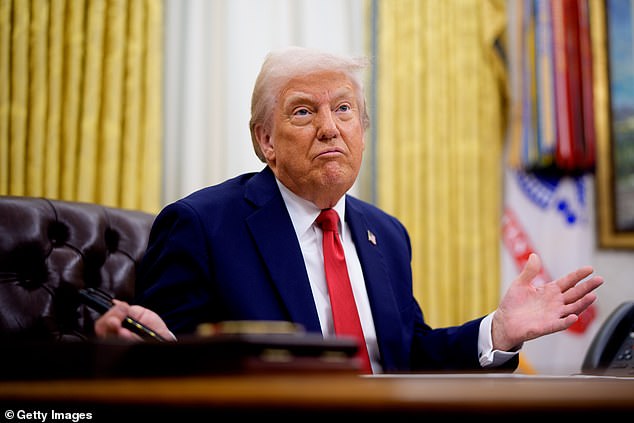Who said of China’s president Xi Jinping, ‘He’s a brilliant guy. He controls 1.4 billion people with an iron fist’?
Yes, that was Donald J. Trump at one of his rallies during the 2024 US election.
And after Trump won, he invited the communist autocrat to his inauguration. Xi turned it down. Too busy exercising his iron fist at home.
Actually, there is a serious point here. Trump perpetually labours under the misapprehension that if only foreign autocrats could have some fun time with him at Mar-a-Lago, they would succumb to his charm and see things his way.
It is astonishingly egocentric, as well as delusional. We are now seeing this with President Putin. Trump genuinely believed he could, by schmoozing the poisoner in the Kremlin, persuade Moscow to abandon its war on Ukraine.
Indeed, Trump regularly claimed that his unique skills as a personal negotiator would ‘end the war in 24 hours’.
Eye-watering
Is it now dawning on the President that Putin can’t be handled like some fellow property developer over martinis at the golf and country club? I doubt it: Trump is too old a dog to learn new tricks.
There is another stark difference between the US and the nations ruled by Xi and Putin. Those are dictatorships, whose peoples enjoy no electoral choice, and where dissent can lead to death.

President Donald Trump said of China’s leader Xi Jinping: ‘He’s a brilliant guy. He controls 1.4 billion people with an iron fist.’ After Trump won the election, he invited the communist autocrat to his inauguration. Xi turned it down
What this means, in terms of Trump’s declaration of trade war on China, is that Xi can allow the sort of deep pain it might cause his people, in a way which a leader of the US can’t.
Or as the exiled Chinese novelist Hao Qun pointed out: ‘Tariffs and even economic sanctions are not Xi Jinping’s pressure points. He is not particularly concerned about the hardships tariffs may cause for ordinary people.’
Trump may not care either, but he is an obsessive observer of opinion polls – or so I was told by someone who had had political dealings with him.
When the inevitable consequence of slapping 145 per cent tariffs on Chinese goods filters through into eye-watering price rises in US consumer markets, and the closure of many American retailers, those opinion polls will direct Trump’s response . . . to seek a rapid exit from the trade war he started, long before any of the supposed benefits accrue. And don’t think that Beijing is unaware of this.
Then there are, in little more than a year and a half, the mid-term elections. If consumer price inflation is plaguing Main Street – which was the chief reason for Joe Biden’s unpopularity, post the Covid pandemic – then Republicans will panic. Those are the sort of democratic checks that Xi has no need to consider.
The Chinese president for life did have one moment when public dissent might have capsized his leadership.
Beijing’s brutally enforced ‘Zero-Covid’ policy, enforcing lockdowns long after the rest of the world had abandoned them, eventually sparked the sort of protests that had not been seen in China for decades. Overnight, Xi abandoned the policy, without explanation or apology.

Is it now dawning on President Trump that Vladimir Putin can’t be handled like some fellow property developer over martinis at the golf and country club?
But in the case of the trade war, the communist leader can rely on the nationalism of the Chinese people, which should never be underestimated. They think, historically, in terms of ‘the century of humiliation’ of China by Western powers.
In this context, an abhorrence of quailing before Washington is something Xi can and will exploit, both for his own popularity internally and in terms of the image China presents to the rest of the world.
The fact that Trump is deeply unpopular outside America will only be of assistance in this. I have been struck by how even those in this country disgusted by the ruthless and intensely repressive nature of Xi’s regime still look forward to Trump getting a bloody nose.
Bulwark
There will be many more of them in the EU, which Trump, justifying his tariffs, said ‘was created to screw the United States, that’s the purpose of it’.
In reality, the US was instrumental in creating what became the EU, seeing such an entity as a bulwark against the Soviet empire.
The CIA was the biggest single financial backer of the European movement in the 1950s, and what we now call the EU was the brainchild of Jean Monnet, who had the closest imaginable relationship with the US state department.
The point is that if Trump were strategic in his desire to isolate China, he would not simultaneously pick a fight with the EU.
When Ursula von der Leyen came in as President of the European Commission, she stated her intention to reduce the risks of dependence on China.
But the effect of Trump’s imposition of 25 per cent tariffs on cars and steel from the EU (and from the UK too, by the way) is to weaken the hand of European leaders who favour such a realignment.
But, obviously, Trump is not strategic. His supporters eulogise what they call the President’s ‘4-D chess’, in terms of his whipsawing decision-making, but – and I speak as someone who has written books on chess – Trump is as far from a Grandmaster as it is possible to imagine.
Chess demands the ability to think deeply before moving, and a complete absence of emotion in decision-making. Trump is, to an extraordinary extent, a creature of impulse charged with ferocious energy.
Perhaps the best insight into this came from a former employee in his casino business, John O’Donnell, who published a book – called Trumped! – about the experience.
O’Donnell wrote: ‘Donald’s conception of time was so circumscribed that it was astounding. He did business entirely in the moment.’
Colossal
This is the polar opposite of men such as Xi and Putin, who can at least be recognised as patient and enduring in their pursuit of political objectives, however inimical those are to our own security.

The reason for President Trump’s dizzying 180-degree turn on tariffs was not just the plunge in share prices that underpin the retirement funds of millions of Americans, but also the bond market fleeing from the dollar
We saw that Trumpian inconstancy on a world-shaking scale last week, as he suddenly deferred the very high level of tariffs he had imposed only days earlier against hundreds of nations (including an island inhabited purely by penguins, blameless birds who, up until then, had no reason to be anti-American).
The reason for this dizzying 180-degree turn at speed was not just the plunge in share prices that underpin the retirement funds of millions of Americans but also the bond market fleeing from the dollar. This is a threat to America much greater than anything that Xi can muster.
That the dollar has been, since the aftermath of the Second World War, the world’s reserve currency is, as the former French president Valery Giscard d’Estaing put it, America’s ‘exorbitant privilege’.
It has enabled the effortless funding of the US’s colossal debts and, by keeping those borrowing rates low, means that poor households in the developing world subsidise much richer ones in the US.
It has, in effect, funded the American dream. But last week, even the Greek government was able to raise money on the international markets at a lower rate than the US, so great was investors’ panic over Trump’s wild wilfulness.
And Trump’s next move on the world trade chessboard? We have no idea. And neither does he.







